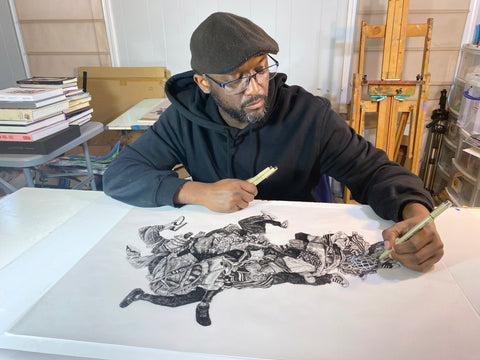GUILTY BY ANTOINE WILLIAMS

Julian: As an interdisciplinary artist, how do you choose which medium to use for each piece?
Antoine: It depends. Sometimes it’s a matter of where the work is taking me conceptually. I just follow that thread wherever it takes me. Other times I’m just interested in a material or process. If you play and experiment over a period of time, you can end up with some really interesting results.
Julian: I love the world building in your work and how you draw from a combination of reality and mythology to create your pieces. What fictional stories are inspiring your work right now?
Antoine: N.K. Jemison has a book titled Emergency Skin, which is an amazing social science fiction book about class and race, she also has another book called The Fifth Season which is great. Tananarive Due has a graphic novel titled The Keeper. I just finished watching Andor which has so much amazing world building. Also, Everything Everywhere All At Once which is one of the best movies I’ve seen in years.
Julian: What have you learned from being an art educator?
Antoine Williams: I’ve learned from teaching that we are all on our own journeys and that learning is a lifelong project. What you learn in class is just one part of that journey. I’ve also realized that you can learn something from everyone. Teaching painting isn’t just about learning how to paint. It’s about problem solving and critical thinking that hopefully can be used in the real world.
Julian: What impact do you want your practice to have in the world?
Antoine: Ideally, I would like my practice to serve as a tool to subvert the status-quo.
Julian: What is the significance of wheat pasting in your work?
Antoine: While in my first semester of grad school I had a bit of a culture shock in terms of race and class. It took an adjustment to be in such a white, upper-class, insular space. Learning the history of paint, one that is very exclusionary, I wanted to subvert that by working with a medium that is very accessible. I’ve also always been influenced by street art and the democratic nature of it all.
Julian: What does Red Springs, North Carolina mean to you?
Antoine: It’s home. It’s full of beautiful Black, brown and Indigenous working-class people who have built equally beautiful cultures. Growing up there inspired how I view the world as well as how I move through the art world and academia.
Julian: You're stranded on an island and can only take three things. What do you take?
Antoine: The smart move would be a satellite phone, fresh drinking water and a good knife. But I’d probably just settle for Outkast’s entire catalogue, the first, second, and fourth seasons of Atlanta and everything Octavia Butler has ever written.